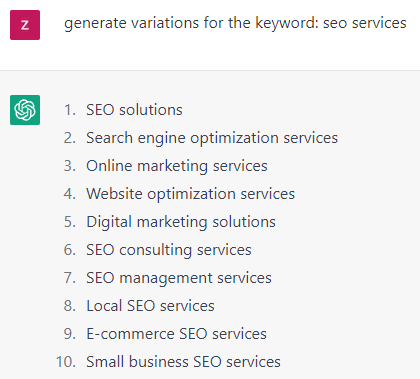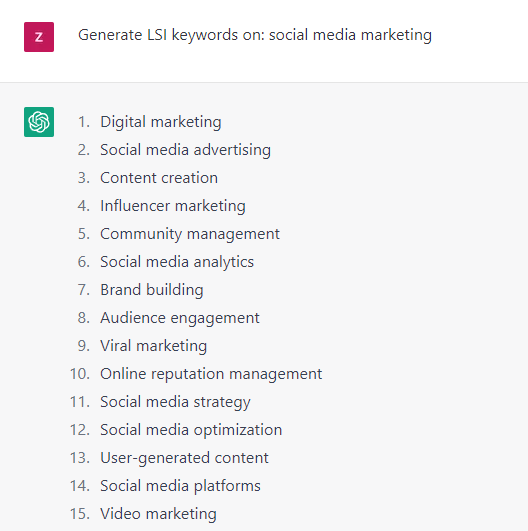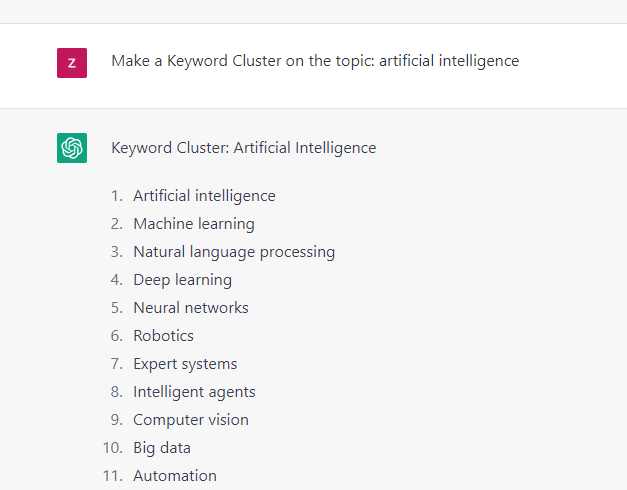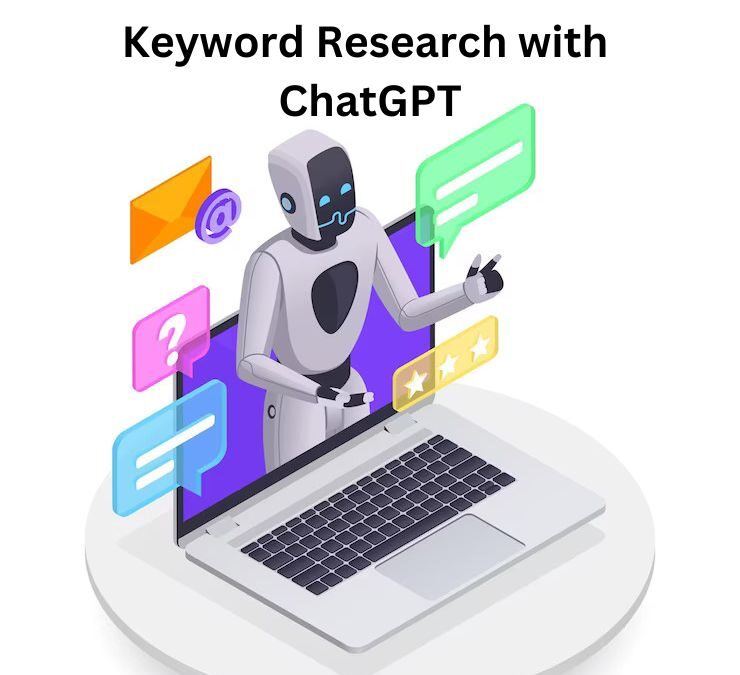As you know, ChatGPT has revolutionized every industry it has been introduced to.
Similarly, in the SEO industry, ChatGPT has proved to be quite helpful.
The keyword research that used to take a whole day can now be done in minutes with the help of ChatGPT.
Today, we will see how to use ChatGPT for keyword research in the right way.
How to use ChatGPT for keyword research?
I will provide different Prompts and ideas to use ChatGPT for keyword research in an efficient way.
Keyword Variations
In the past, SEO professionals were able to trick Google by using keyword stuffing to rank higher.
However, nowadays, it has become difficult and tricky to place keywords in the content in the right way.
We have to add variations of primary keywords to keep the content user-friendly, natural, and relevant.
You can use ChatGPT to generate variations related to your primary keyword or topic. This will save your time and effort.
Prompt 1:
generate variations for the keyword: seo services

As you can see in the screenshot, ChatGPT has generated variations of the given keyword.
Prompt 2 for finding a specific number of variations:
generate 13 variations for the keyword: seo services

Get new Keywords Ideas using a Seed keyword
To find relevant keywords related to a seed word, you need to search on Google and use various tools.
However, ChatGPT has made this process much easier.
You can use Prompts to generate keywords or content ideas related to your seed topic.
Prompt:
Generate 15 keywords on: seo

Long-tail keywords
There is no doubt that long-tail keywords can help you rank quickly because they are less competitive.
So far, to find long-tail keywords, you have been using tools such as Ahrefs, SEMrush, and other similar tools.
But now you can easily find good and easy-to-rank long-tail keywords using ChatGPT.
Prompt:
Generate Long-tail keywords on: digital marketing

That’s now ChatGPT has generated amazing long-tail keyword ideas.
LSI keywords
To make your content more understandable for Google, it is important to use LSI (Latent Semantic Indexing) keywords.
LSI keywords are industry-relevant keywords that support the primary topic of your content and make it more relevant to Google.
Here is how you can generate LSI keywords using ChatGPT.
Prompt:
Generate LSI keywords on: social media marketing

If you want to get a specific number of LSI keywords then you can use the below command in Chat GPT.
Prompt:
Generate 5 keywords on: social media marketing

Keyword clusters
To improve your blogging strategy, and create topical relevancy, it is essential to create keyword clusters to connect blog topics with each other.
Topical relevance, also known as topical authority helps establish Google’s trust on your website through E-E-A-T (Experience, Expertise, Authoritativeness, and Trustworthiness) ranking factor.
Here is how you can make keyword clusters using ChatGPT.
Use the below prompt:
Make a Keyword Cluster on the topic: artificial intelligence

You can see the amazing results in the screenshot. ChatGPT has created a keyword cluster on “artificial intelligence”
Keywords Funnels
Categorizing your blogging content marketing topics into funnels based on the stages of the buyer’s journey can be a time-consuming and difficult task.
You can easily do this with ChatGPT.
All you have to do is provide ChatGPT with your list of keywords and give the following Prompt.
Prompt:
generate keywords on “What is digital marketing” and categorize them for 3 inbound marketing buyer journey stages on:

Blog topic ideas
Finding blog topics has become very easy with ChatGPT.
All you need to do is give ChatGPT the following Prompts and it will find amazing blog ideas for you, saving you time.
Prompt 1:
Generate some blog topic ideas on: seo

Prompt 2:
Generate 10 blog topic ideas on: SEO

Guest blogging keyword ideas
When you are guest blogging and you found an opportunity to publish your content, then it is important for you to find powerful topics.
Topics that can impress the website owner so that they happily publish your content on their website.
Use the below command to easily find guest blogging topics with titles.
Prompt:
Generate content topic ideas with titles on “web development” niche

You can also use this prompt:
Generate guest post topic ideas with titles on “web development” niche
Generate headings
Headings and subheadings in content not only help to build the structure of the content but also support the primary topic and make the content understandable for both search engines and users.
Finding good and appropriate headings can be a difficult task.
However, ChatGPT can generate amazing headings for you, which can save you a lot of time and struggle.
Generate headings on the topic: Future of Digital Marketing

Generate FAQs
FAQs (Frequently Asked Questions) are more beneficial for users than search engines.
After writing content, we often have very few FAQs in mind that will be helpful for users and related to the topic.
ChatGPT can help you find related FAQs. Use this Prompt to initiate the search.
Generate FAQs on the topic: Keyword research using ChatGPT

FAQs on ChatGPT Keyword Research
Can ChatGPT provide long-tail keywords for niche topics?
Yes, ChatGPT can provide long-tail keywords for niche topics.
You only need to give the following command to ChatGPT.
How accurate is ChatGPT for keyword research?
ChatGPT does not provide data like search volume and competition of keywords, but it can accurately give you some amazing keyword suggestions like LSI keywords, blog keywords, and keyword variations.
It’s good to check the keywords given by ChatGPT once as it’s a machine and not 100% perfect.
What is ChatGPT, and how can it help with keyword research?
ChatGPT is an AI-based chatbot that is made to interact with humans and answer their queries in a human way.
ChatGPT can suggest a lot of helpful keywords like long-tail keywords, keywords according to the buyer’s journey, blog keywords, LSI keywords, and more.
You can create keyword funnels with ChatGPT. You can also create keyword clusters using ChatGPT.
Does ChatGPT consider keyword difficulty and competition when generating keyword suggestions?
ChatGPT does not provide keyword difficulty, competition, and any kind of data like this.
Because ChatGPT is a chatbot, not a specific keyword research tool.
Is ChatGPT suitable for both SEO and PPC keyword research?
ChatGPT keywords are more beneficial for SEO and content optimization.
For PPC, you should use the keyword planner by Google.
How does ChatGPT compare to other keyword research tools?
ChatGPT can only give keyword ideas, blog ideas, and different types of keywords.
ChatGPT cannot provide keyword insights and data.
Other tools like Ahrefs provide keyword ideas and data insights as well.
Can ChatGPT help with competitor analysis?
No, it does not.
Can ChatGPT be used to generate content ideas based on keyword research?
Yes, ChatGPT can be very helpful in generating content ideas based on keyword research.
How can ChatGPT help with content optimization for search engines?
ChatGPT can provide you impressive content headings (H1, H2, H3, H4, and further) that will make your content structure good and understandable for search engines.
ChatGPT can provide you with LSI and supporting keywords to make your content more search-engine friendly.
more:
Can you Use ChatGPT For SEO Content? [Evolution in AI Industry]

